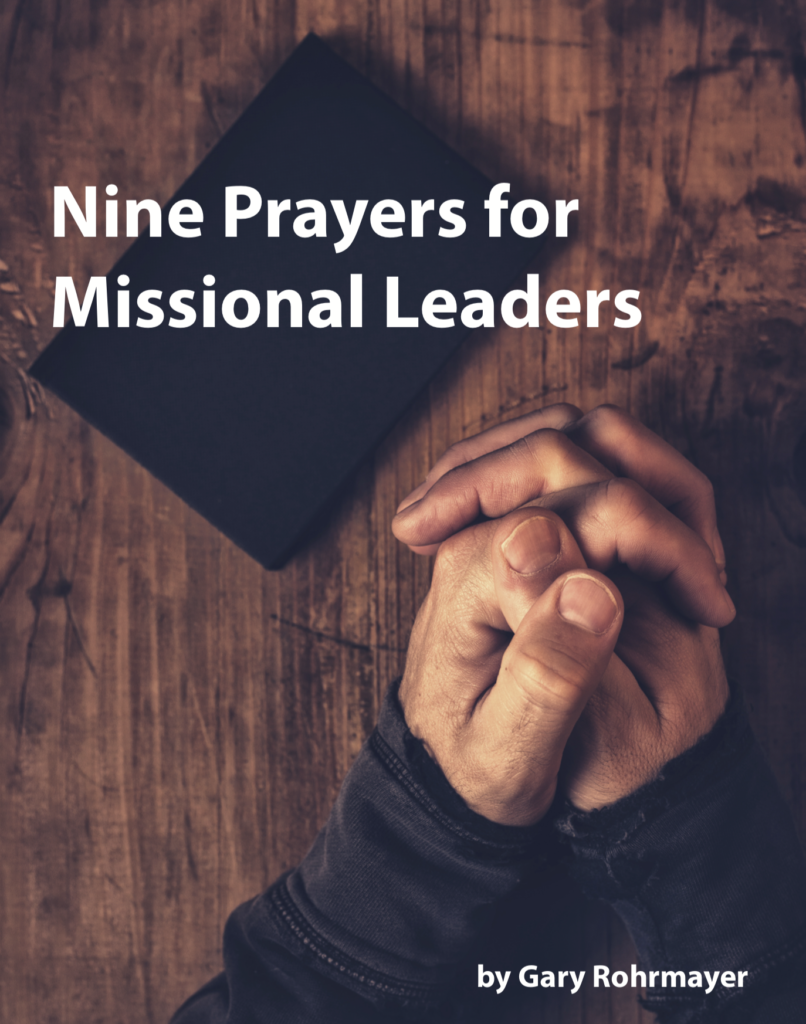Ed Stetzer recently made a passionate appeal to church leaders saying, “This is not the crisis, we are weeks away from the real crisis.” The crisis is not that we cannot meet for worship or small groups—the crisis is not that our churches are losing revenue or our church mortgages cannot be paid. The crisis is quickly becoming a life and death situation that must be taken with the utmost seriousness, courage and faith that is fused with undeniable hope in the love of God.
So how should we respond as Christian leaders?
I think we need to address the why’s before we figure out the how’s in order to have a clear biblical framework to guide us through this unprecedented season. Once we understand the nature of our calling as followers of Jesus and our duties as leaders, then we will be better able to perform the responsibilities God has set out for us.
Paul speaking to Titus, a regional leader whose task was to strengthen this growing yet fledgling movement of churches on the Island of Crete, writes, “The reason I left you in Crete was that you might put in order what was left unfinished” (Titus 1:5). The term “put in order” or “straighten out” comes from the same word that we get the words orthodontics and orthopedics. The orthodontist puts braces on your teeth to straighten them out. The orthopedist puts on a cast or a brace so that your bones will heal, mend, and be strengthened.
Titus was to provide braces that would strengthen this immature movement of churches, which could, at that time, be up to one hundred churches on this island.
Paul gives Titus three braces that he was to provide to strengthen the churches in this movement:
- Appoint qualified leaders in every town (Titus 1:5-15).
- Promote sound doctrine (Titus 2:1-10) and gospel-centered living (Titus 2:11-14).
- Remind people how to live missionally in this world (Titus 3:1-15).
Titus’ commission involved re-establishing the basic foundations of the church to gospel-centered churches that saturate the Island of Crete and beyond. Grasping this context helps us as leaders in this pandemic crisis wrestle with ways to promote responsible citizenship through our churches.
Seven Qualities of a Remarkable, Gospel-Centered Citizen.
Paul writes, “Remind the people to be subject to rulers and authorities, to be obedient, to be ready to do whatever is good, to slander no one, to be peaceable and considerate, and always to be gentle toward everyone” (Titus 3:1-2).
First, Paul addresses the importance of this subject by using words of urgency. He writes, “Remind the people…” (vs 1). To paraphrase Paul, he is saying, “Pastor, this means you must keep on continually reminding your people of the principles and qualities of what it means to be a remarkable, gospel-centered citizen in a pagan culture.”
Let consider Paul’s seven virtues of a remarkable, gospel-centered citizen:
- Submissive in attitude. He writes, “to be subject to rulers and authorities.” We voluntarily subject ourselves to government authorities because we believe that they are put in place sovereignly by God (Romans 13:1-7; I Peter 2:11-17). Understanding that the Island of Crete was under the ruthless rule of the Roman Empire, they were to submit to the reasonable and responsible rule of the government as long as it did not cause them to violate the laws of God. Peter and John refused the order of the Jewish officials to stop teaching in the name of Jesus by stating: “We must obey God rather than human beings!” (Acts 5:29). Here is where ‘the great commandment and great commission rule,’ helps discern when civil disobedience is necessary. You may ask yourself: Is my government asking me to reduce my love for God and my love for my neighbor? Or is my government asking me to stop proclaiming the good news of Jesus? In this pandemic crisis, I see neither. So, I would encourage us to do all we can to submit to the guidelines of social distancing while looking for more ways to connect with neighbors to share the hope of Jesus in this challenging season.
Question: Are your church members fighting or submitting to the guidelines proposed by the federal, state and local authorities?
- Obedient in behavior. Paul writes, “to be obedient.” We are not only to be submissive in attitude, but we are to be obedient in our actions. Paul writes, “This is also why you pay taxes, for the authorities are God’s servants, who give their full time to governing. Give to everyone what you owe them: If you owe taxes, pay taxes; if revenue, then revenue; if respect, then respect; if honor, then honor” (Romans 13:6-7). The Apostle Peter offers these same thoughts, “Live as free people, but do not use your freedom as a cover-up for evil; live as God’s slaves.Show proper respect to everyone, love the family of believers, fear God, honor the emperor” (I Peter 2:16-17). We, as Christian citizens, should be the highest examples of responsible citizenship because we want to point people to the true King, Jesus Christ, the Risen Lord, and Only Savior.
Question: Do you agree with the statement that Christians should be the highest examples of responsible citizenship?
- Benevolent in spirit. He continues, “…to be ready to do whatever is good.” It is interesting that three times he repeats this charge (vs 1, 8, 14). Paul moves our responsibilities from a passive posture (submission and obedience) to a proactive position of blessing the world around us. Peter, in the context of believers submitting to authorities, writes, “Live such good lives among the pagans that, though they accuse you of doing wrong, they may see your good deeds and glorify God on the day he visits us…For it is God’s will that by doing good, you should silence the ignorant talk of foolish people” (I Peter 2:12,15). Being right in line with the teachings of Jesus: That we are to be salt and light in this world, “…that they may see your good deeds and glorify your Father in heaven” (Matthew 5:13-15). May the world see the beauty of Jesus through the scattered church, and may their heart be captured by the goodness and greatness of our God.
Question: How are you as the pastor promoting responsible benevolence to the needy in your community?
- Speaks well of everyone. Paul continues, “to slander no one…” (vs. 2). Paul expands his instructions beyond our relationship with the rulers or authorities to be all-inclusive by using the terms “no one” and “everyone.” The word slander here is the same word for blasphemy. The Bible is very serious when it comes to speaking evil of or maligning God (Leviticus 24:16; Numbers 15:30; Mark 3:29). It is just as serious about speaking evil or contemptuously of people created in the image of God. Jesus said, “But I tell you that anyone who is angry with a brother or sister will be subject to judgment. Again, anyone who says to a brother or sister, ‘Raca,’ is answerable to the court. And anyone who says, ‘You fool!’ will be in danger of the fire of hell” (Matthew 5:22). The terms’ Raca’ and ‘you fool’ were slanderous and contemptuous words against another human being that bring with them the judgment of God. It is interesting that the scriptures teach us to remove all evil slander from our vocabulary (Ephesians 4:31; Colossians 3:8) and to replace them with holy and godly prayers for all people. Paul writes, “I urge, then, first of all, that petitions, prayers, intercession, and thanksgiving be made for all people—for kings and all those in authority, that we may live peaceful and quiet lives in all godliness and holiness. This is good and pleases God our Savior, who wants all people be saved and to come to a knowledge of the truth” (I Timothy 2:1-4).
Question: How are you encouraging responsible rhetoric and focused prayers for leaders, authorities and all people?
- Is peaceable. Paul writes, “…to be peaceable” (vs. 2). Interestingly, the actual translation is negative, ‘don’t be a brawler’ or ‘cease fighting.’ I am sure just as in Paul’s day as well as our own; there was a lot of anger stirred up while living in an unjust pagan culture. The human cruelty and blatant disregard for justice is so unnerving. The lack of common sense and the neglect of true wisdom can drive followers of Jesus mad at times. Yet the Bible instructs us, “If it is possible, as far as it depends on you, live at peace with everyone” (Romans 12:18). To live at peace means to be at peace. Peace is a settled confidence that comes from being right with God (Romans 5:1), which leads one to experience inner tranquility, relational poise, and a profound sense of being protected (Philippians 4:8). As followers of Jesus, we must refrain from adopting “the arts of the agitator.” [1] Yet from a position of inner peacefulness, we should bring words of peace into our conversations that deescalate the situation while seeking ways to present the gospel of peace to an unsettled world. In a day when conflict and controversy are leveraged to sell anything, we as followers of Jesus should rise above the fray and be reasonable and peaceable people.
Question: What are you as a pastor doing to promote peace in the midst of all this crisis?
- Practice consideration for others. Paul uses the word “considerate” (vs. 2). This word is the outward expression of gentleness. When we put the concerns for others above our own rights we are being reasonably forbearing, patiently kind and sweetly considerate. This is very personal to the Cretans, who were described earlier as “Cretans are always liars, evil brutes, lazy gluttons” (Titus 1:12). They were known as being uncivilized barbarians, who exhibited the unrestrained indulgence of wild and ferocious beasts. Yet as new followers of Jesus they were to take on the gentle character of their Savior (Matthew 11:29) and follow his example of relinquishing their personal rights for the betterment of others (Philippians 2:5-12). The Bible appeals to us, “Let your gentleness be evident to all” (Philippians 4:5). We are not to respond as evil brutes always fighting for our rights but as respectful, considerate, and gentle people. The Apostle Peter says this demeanor is what makes our testimonies attractive. He writes, “Always be prepared to give an answer to everyone who asks you to give the reason for the hope that you have. But do this with gentleness and respect” (I Peter 3:15). The message of the gospel becomes more apparent when the power of the gospel comes alive through our firm convictions and sweet consideration of others.
Question: How are you as a pastor encouraging considerate behavior for the purpose of making the gospel attractive to your community?
- Humble in attitude. Paul finishes this list, “and always to be gentle toward everyone.” Whereas consideration is the outward expression of gentleness, here it speaks of the inward attitude of humility, which is the foundation of all our behaviors. Andrew Murray wrote, “The root of all virtue and grace, of all faith and acceptable worship, is that we know that we have nothing but what we receive, and bow in deepest humility to wait upon God for it.” [2] To reinforce this posture of humility, Paul reminds them of where they came from and how God’s mercy alone saved them. He writes, “At one time we too were foolish, disobedient, deceived and enslaved by all kinds of passions and pleasures. We lived in malice and envy, being hated and hating one another” (Titus 3:3-4). One historian used the following words to describe the Cretans, ‘a turbulent race,’ ‘fighting amongst themselves for generations,’ ‘whose rebellious propensities seemed to be unquenchable,’ ‘always producing disorder’ and possessing a ‘factious and seditious spirit.’ Yet this is where the gospel met them. Paul continues, “But when the kindness and love of God, our Savior appeared, he saved us, not because of righteous things we had done, but because of his mercy. He saved us through the washing of rebirth and renewal by the Holy Spirit, whom he poured out on us generously through Jesus Christ our Savior, so that, having been justified by his grace, we might become heirs having the hope of eternal life” (Titus 3:4-7). In Paul’s mind, there is no room for pride in our lives, only room for humble gratitude.
Question: How are you as a pastor modeling and promoting a spirit of humble dependence on the Lord during this crisis?
Why are we called to be remarkable, gospel-centered citizens?
Paul answers that question, “This is a trustworthy saying. And I want you to stress these things, so that those who have trusted in God may be careful to devote themselves to doing what is good. These things are excellent and profitable for everyone” (Titus 3:8).
Our beliefs should always impact our behavior. As recipients of God’s mercy, we are called to be merciful to others. As followers of Jesus, we should be taking the lead in doing good to others and not dragging our heals while others take the lead.
Paul wants Titus “to stress these things.” There is a heightened level of urgency in Paul’s words that we read earlier. He wants him to courageously and confidently teach this immature movement of churches not only to proclaim the gospel but to live out the gospel for the benefit of every person on the Island of Crete.
Pastors, church leaders and every follower of Jesus, this is our time to shine, this is our time to stand out, this is our time to be kind, merciful and fearless all in the name of Jesus the Risen Lord and only Savior.
So, let us all be remarkable citizens! Let us be humble, considerate and peaceable! Let us be live, breathe and speak the gospel! Let us lead the way by being eager to do good!
[1] Hiebert, D. E. (1981). Titus. In F. E. Gaebelein (Ed.), The Expositor’s Bible Commentary: Ephesians through Philemon (Vol. 11, p. 443). Grand Rapids, MI: Zondervan Publishing House.
[2] Murray, Andrew. (1997). Humility: The Beauty of Holiness (pg. 29). Fort Washington, PA: CLC Publication.



















